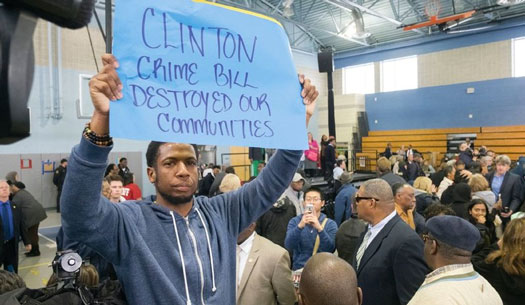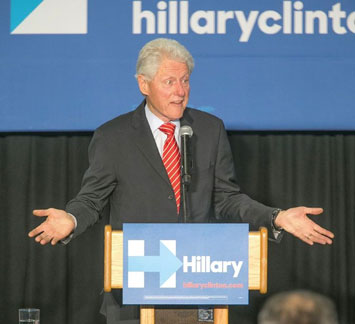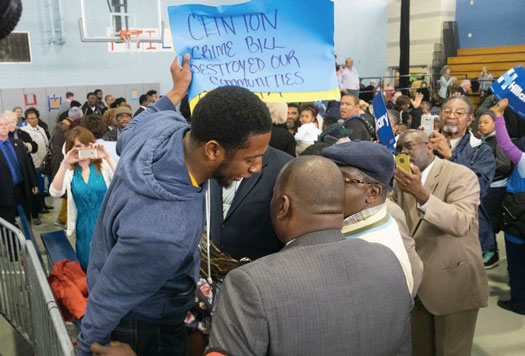Confronting Bill Clinton And The Devastating Legacy Of His Crime Bill
By Jehron Muhammad -Contributing Writer- | Last updated: Apr 13, 2016 - 12:56:04 PMWhat's your opinion on this article?

Protester Rosco Farmer in the back of the auditorium near the end of former President Bill Clinton’s rally for Democratic presidential candidate Hillary Clinton, April 7, in Philadelphia. Bill Clinton was interrupted by people in the crowd holding signs reading “Clinton crime bill destroyed our communities” and “Welfare reform increased poverty.” Photo: AP Wide World
|
PHILADELPHIA— New York Times Op-Ed columnist Charles Blow posted a video on his Facebook page and Lincoln Blades wrote in Rolling Stone magazine exposing former President Bill Clinton and his “hypocritical” defense of his 1994 crime bill while stumping in Philadelphia for his wife and presidential hopeful Hillary Clinton.
Writer Blow said the small percentage of good the crime bill did is outweighed by the devastation it brought to the Black community—with Blacks still suffering the consequences of the legislation. Mr. Blades, on the other hand, called it refreshing “to see a white person with power who’s done real harm to our (Black) community say what he truly believes.”
The former president’s problems began with his response during an April 7 rally to signs held up by Black Lives Matter demonstrators. One sign read, “Clinton crime bill destroyed our communities!” Another read, “Black youth are not super predators”—a reference to Hillary Clinton’s vigorous verbal support of her husband’s crime bill. Bill Clinton went off script to defend the bill and his wife’s public support of the legislation.
In defense of the crime bill, America’s 42nd president said, “Because of that bill we had a 25-year low in crime, a 30-year low in the murder rate … a 46-year low in deaths of lives by gun violence.”

Former President Bill Clinton speaks during a rally for Democratic presidential candidate Hillary Clinton, April 7, in Philadelphia. Bill Clinton was interrupted by people in the crowd holding signs reading “Clinton crime bill destroyed our communities” and “Welfare reform increased poverty.” Photos: AP Wide World
|
Concerning the “super predator” statement made in 1996 by the now Democratic party frontrunner, Mr. Clinton said, “I don’t know how you would describe the gang leaders who got 13-yearolds hopped up on crack and sent them out in the streets to murder other African American children.” Perhaps you thought those who engaged in crime were good people, my wife didn’t, he retorted angrily. The response was a firestorm of anger as Black Twitter responded to the outrageous words uttered by the former governor of Arkansas. The Kennedy-esque “New Democrat” was lambasted on social media and his record was uncovered.
“Bill Clinton says that he ‘almost’ wants to apologize for his remarkable episode yesterday—you know, when he embraced long-debunked, racially coded ‘super-predator’ rhetoric, compared Black Lives Matter protestors to Republicans and insisted that they support murderers, and blamed his crime bill on black politicians,” observed author Michelle Alexander in an April 8 Facebook post.
“Personally, I am not demanding an apology from Bill Clinton. Instead, I would like to say thank you. Thank you, Bill, for giving the nation a ten-minute tutorial on everything that was wrong (and apparently remains wrong) with the ‘New Democrats’ and their approach to racial politics.
“Unfortunately much of the mainstream media seems to be buying (yet again) much of what Bill was selling yesterday. So to recap what should be obvious by now: Black politicians and activists were not asking for ‘get tough’ measures and nothing else back in the 1990s. Some black politicians opposed the Clinton crime bill, and those who supported it weren’t seeking punishment and nothing more; they desperately wanted massive investment in jobs and schools so the young people trapped in communities where work had suddenly disappeared would have some hope of survival. It is a gross distortion to suggest that black people wanted billions of dollars slashed from child welfare, housing and other public benefits in order to fund an unprecedented prison building boom. It was Bill Clinton’s deliberate political strategy—one he championed along with the ‘New Democrats’—to appeal to White swing voters by being tougher on struggling Black communities than the Republicans had been, ramping up the drug war and gutting welfare. That strategy of ‘getting tough’ while at the same time eviscerating the federal social safety net was NOT supported by many of the Black politicians he seeks to use as cover. Rep. John Lewis (who Clinton referred to yesterday as the ‘last remaining hero of the civil rights movement’) fiercely opposed welfare reform, accurately predicting that it would thrust more than a million more kids into severe poverty.
“John Lewis said back then: ‘How can any person of faith, of conscience, vote for a bill that puts a million more kids into poverty? What does it profit a great nation to conquer the world, only to lose its soul?’
“The young people challenging Bill Clinton yesterday were asking these very same questions. You may not agree with their tactics, but they were, in their own way, fighting for the soul of the Democratic party and American democracy itself. Whether our nation can be redeemed in the long run remains to be seen.”

Protester Rosco Farmer is corralled in the back of the auditorium by civil affairs officers near the end of former President Bill Clinton rally for Democratic presidential candidate Hillary Clinton, April 7, in Philadelphia. Bill Clinton was distracted by people in the crowd holding protest signs.
|
Even Hillary Clinton’s primary opponent, Sen. Bernie Sanders, called out the use of racially coded language inherent in the use of the “super-predator” term. “Unacceptable. I think we all know what that term meant. In the context that it was said. We know who they were talking about,” said Sen. Sanders during an April 9 forum at the Apollo Theater in Harlem. The forum included longtime activist and singer Harry Belafonte, director Spike Lee, pro-Sanders and former Ohio state senator Nina Turner and Erica Garner, whose father Eric Garner died following a chokehold by a New York police officer on Staten Island in 2014. Ms. Sanders, Mr. Belafonte and Mr. Lee support Sen. Sanders.
Someone from the audience shouted, “Right, Black people.” “That’s exactly right, that’s who it was. And I think the president owes the American people an apology for trying to defend what is indefensible,” said Sen. Sanders who went on to criticize the Clinton administration for its brutal welfare reform policies.
But there is another aspect to this drama and Mr. Clinton’s remarks and patronizing tone might have slipped by as a slip of the tongue—except that at the 2015 NAACP Convention in Philadelphia, Mr. Clinton apologized for the crime bill. His exact words, “I signed a bill that made the problem worse and I want to admit it.”
Criticism of the bill stemmed from its offer of billions in funding for new prisons— but only if recipients of the funds adopted “truth in sentencing laws” that would reduce parole eligibility for prisoners.
The crime bill also established mandatory life sentences for those convicted of a third violent felony and other punitive measures. By the end of the Clinton presidency, the number of people in America’s prisons rose by over 60 percent, according to the Brennan Center for Justice.
Tamika Mallory, an activist and board member of the Justice League of New York, told Buzz Feed that the former president’s views are out of touch with reality—and his sincerity suspect.
“Bill Clinton’s comments beg the question whether his apology—about how his policies as president negatively impacted the Black community—was genuine or a campaign strategy to make Americans move past the devastation his administration caused,” she said. “What we saw yesterday is a person who is very much out of touch and I believe his true colors have once again appeared.” Those true colors include his presidency leading a Democratic charge into a “Southern strategy” to appeal to poor and working class Whites by adopting “the very same strategy in an effort to win back the so-called White swing voters, the Reagan Democrats, the folks who had defected from the Democratic Party in the wake of the civil rights movement,” said Ms. Alexander, author of “The New Jim Crow author,” in a 2003 interview.
To add insult to injury, during his administration laws were passed that disproportionately affected Blacks, including ending access to federal financial aid for education upon release from prison for drug offenses and banning public housing based on arrest records, not convictions. Under federal law, exoffenders were banned “for the rest of their lives” from access to food stamps if convicted of a felony drug crime, Ms. Alexander noted.
The consequences of the above policies have been catastrophic. Unable to find their way in society after eventual release from the prison, many ex-offenders simply returned to criminality.
Urban neighborhoods were victimized by a federal policy pursued for political motives despite the social consequences. This resulted in over 1.7 million children under the age of 18 having imprisoned parents. Many of these “incarcerated parents,” reported a Congressional Research Service study, “Economic Impacts of Prison Growth,” were previously the “main breadwinners” and their imprisonment led to increased household instability and increased poverty.
Mr. Blades wrote, “Bill Clinton’s Nineties-era policies with Hillary Clinton’s support … irreparably harmed the Black community by using racially coded language to support mass incarceration and damaging ‘welfare reform.’ ”
Mr. Blow, in his video, noted that the 1994 crime bill criminalized non-violent, mostly Black and Hispanic drug users while today White heroin addicts are seen as having an illness worthy of treatment. It shows the racism at the root of the former president’s policies, he said.
Speaking in the Mt. Airy section of Philadelphia at the conclusion of the support rally for Hillary Clinton, Black Lives Matter member and Philly resident Erica Mines told the Philadelphia magazine, “I’m here to say Bill Clinton or Hillary Clinton is not a good person. This is not about whether I like them. Their politics have hurt the Black community, and that’s all that there is. They don’t deserve the Black vote.” How this will play out in the April 19 Democratic primary and with Black voters remains to be seen.
INSIDE STORIES AND REVIEWS
-
-
About Harriett ... and the Negro Hollywood Road Show
By Rabiah Muhammad, Guest Columnist » Full Story -
Skepticism greets Jay-Z, NFL talk of inspiring change
By Bryan 18X Crawford and Richard B. Muhammad The Final Call Newspaper @TheFinalCall » Full Story -
The painful problem of Black girls and suicide
By Charlene Muhammad -National Correspondent- » Full Story -
Exploitation of Innocence - Report: Perceptions, policies hurting Black girls
By Charlene Muhammad -National Correspondent- » Full Story -
Big Ballin: Big ideas fuel a father’s Big Baller Brand and brash business sense
By Bryan Crawford -Contributing Writer- » Full Story






 Click Here Stay Connected!
Click Here Stay Connected!








